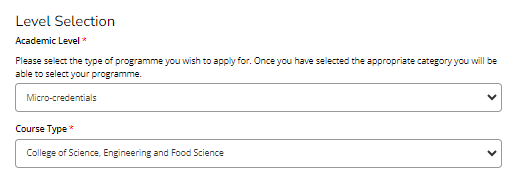| Code | NE6215 |
|---|---|
| Duration | 12 weeks |
| Teaching Mode | Part-Time. See Additional Teaching Mode Information for more info. |
| NFQ Level | Level 9 |
| Fees | €1,000 - HCI Fees Subsidy See Fees and Costs for full details. |
| Closing Date | 17th October 2025 (HCI Subsidy deadline) 22/12/2025 (if paying full fee) |
| Venue | Blended delivery |
| Credits | 5 |
| Start Date | 12th January 2026 |
Outline
Module Goal:
To introduce students to; the pillars of sustainability, methods of assessing the performance of GHG emission reduction projects implemented by industry, and how to interpret the results of these assessments using multi criteria decision analysis (MCDA).
Module Content:
The three core principals of sustainability. Circular economy thinking. Scope 1, Scope 2, and Scope 3 GHG emissions. Using circular economy thinking to enable GHG reductions. Assessing magnitude of GHG reductions. Economic performance of GHG reduction measures. Application of multi-criteria decision analysis to aid in selecting between different measures.
Additional Teaching Mode Information
- 24 x 1Hr(s) Lectures
- 5 x 1Hr(s) Tutorials
Timetable for this course is available here: AY2025_2026 NE6215
Practicalities
Total Marks 100.
- Written Examination - 60 marks.
- Continuous Assessment - 40 marks.
- Assignment 1 - 20 marks.
- Assignment 2 - 20 marks.
Why Choose
Why Choose:
On successful completion of this module, students should be able to:
- Identify and define the three core pillars of sustainability
- Describe the 9 Rs of circular economy thinking
- Apply the 9 Rs to identify measures to reduce GHG emissions from industry considering each Scope
- Demonstrate a knowledge of the rationale behind the calculation of Calculate the potential Scope 1, Scope 2, and Scope 3 GHG emissions savings of measures and interpret results of the same
- Interpret the results of discounted cashflow analysis of potential measures
- Use metrics such as Net present value, levelized cost of energy, levelized cost of abatement to compare measures
- Construct and interpret a marginal abatement cost curve
- Demonstrate an awareness of the underlying principles of common MCDA techniques and criteria weighting methods and how these can be applied to identify the "best" measure to reduce GHG emissions from industry
Requirements
Applicants must have:
- A Second Class Honours Grade 2 (or equivalent) in a primary honours degree (NFQ Level 8) in any discipline
of Engineering OR - a Second Class Honours Grade 2 (or equivalent) in a primary honours degree (NFQ Level 8) in areas of science
that required having completed level 8 mathematical subjects deemed equivalent to those of engineering (e.g. Physics, Mathematical Sciences, some Computing Science degrees), pending assessment by Programme Director OR - a pass in any accredited level 8 Engineering degree followed by professional experience deemed of sufficient added value, pending assessment by the Programme Director.
A quota will be allocated to applicants who do not meet these entry requirements. These applicants will be considered under Recognition of Prior Learning and assessed on the following factors:
- Academic achievement
- Prior Work Experience
- Letter of Reference
- Personal Statement
Fees and Costs
The HCI Pillar 3 Micro-credential Learner Fee Subsidy has been introduced to enable more learners to address critical skills gaps and engage with lifelong learning.
The fee for this micro-credential is €1,000 but applicants who meet the subsidy requirements can attend this micro-credential for €200.
Check your eligibility on the HEA Website
PLEASE NOTE YOU MUST APPLY BEFORE THE 17TH OF OCTOBER TO SECURE THIS FUNDING - AFTER THIS DATE YOU WILL NEED TO PAY THE FULL FEE OF €1,000.
How To Apply
Please select the following options during your online application (once you have created your profile)
Start a new Micro-credentials application by selecting as below

In the application level tab select the options below and then select the programme/module you'd like to apply for

